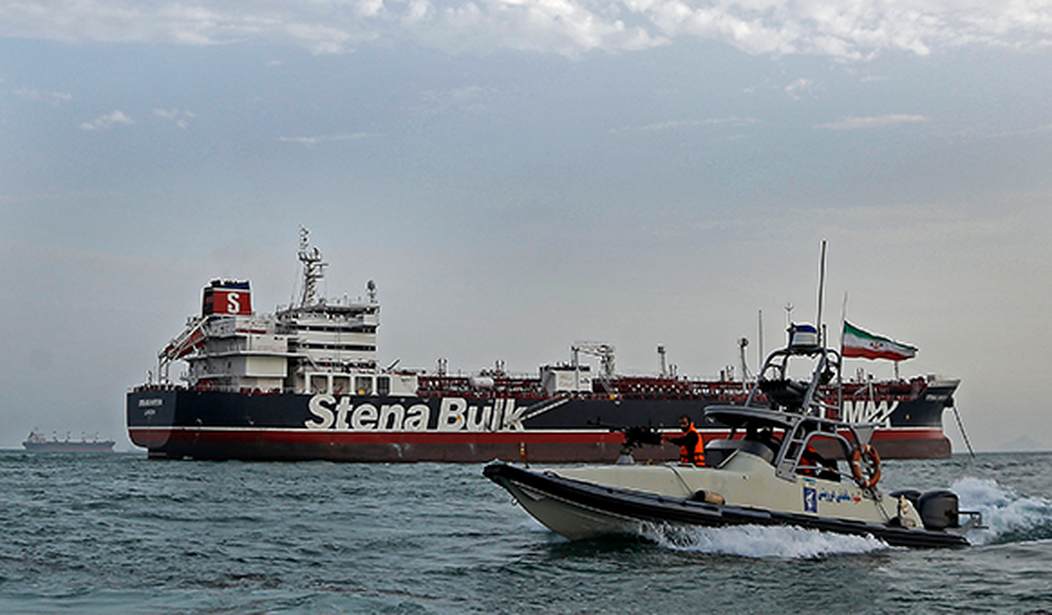Britain went separate ways with its European allies on Monday by courting U.S. involvement in a proposed European maritime task force for defending ships in the Strait of Hormuz from Iranian attacks.
The new approach might be Prime Minister Boris Johnson’s first signal that his new government will align with the United States over Europe as Britain responds to Iran’s seizure of a British-flagged ship two weeks ago. The re-alignment is sure to cause friction with Britain's European partners who insist the United States must stay out of Europe’s response to Iran’s actions.
The unexpected shift in policy came on Monday when the new Foreign Secretary Dominic Raab argued that U.S. participation is necessary for the success of a European task force in the middle east.
“I think we do want to see a European-led approach, but that doesn’t seem to me to be viable without American support as well,” Raab told The Times.
Raab’s statement is a remarkable departure from the stance advocated by his predecessor Jeremy Hunt, who first announced a plan to dispatch a European taskforce to the vital sea lane through which roughly 20 percent of the global oil supply passes through. Back then, Hunt explicitly ruled out U.S. involvement in the European taskforce.
"[The European task force] will not be part of the U.S. maximum pressure policy on Iran because we remain committed to preserving the Iran nuclear agreement," Hunt said, according to Al-Jazeera.
Hunt’s proposal initially earned some cautious support from European allies, including France, Germany, and Italy, according to the Associated Press. However, the European countries have as of yet committed to the deployment of additional naval assets in the region, with German Foreign Minister Heiko Maas believing that it is “too early...to talk about possible forms of German support or participation” in the British plan.
Recommended
The tempered enthusiasm of Europe might have inspired Britain to seek U.S. assistance, especially after the U.S. Secretary of State Mike Pompeo said that “responsibility...falls to the United Kingdom to take care of their ships,” threatening to leave Britain alone in its faceoff with Iran.
Britain has already dispatched two ships to the Strait of Hormuz to provide military escorts to British-flagged ships passing through the unsafe waters. However, reports by Defense News and Washington Examiner argue that the Royal Navy does not have the capacity to maintain a long term presence in the strait without help from allies, a deficiency that probably motivates Britain to reach out to possible partners.
But while Britain has begun to look across the Atlantic for help in the Strait of Hormuz, many European states are still against U.S. involvement in the European taskforce. Maas, the German foreign minister, said that his government does not align with the U.S. “maximum pressure” policy and said “efforts in the region must be recognizably European,” according to the Daily Express. France meanwhile said that the European task force should be “the opposite of the American initiative.”
The United States also has its own maritime mission in the Strait of Hormuz called Operation Sentinel. As part of the operation, U.S. naval and aviation assets are deployed in the region primarily to protect U.S.-flagged ships, according to a Department of Defense press release.
The U.S. operation has as of yet struggled to recruit European allies, according to Bloomberg. The new Defense Secretary Dr. Mark Esper has downplayed the schism with Europe, saying the U.S. and European efforts in the region are “complementary.”
Britain’s standoff with Iran started off early this month, when British troops captured Grace 1, an Iran-owned oil tanker, off the coast of Gibraltar for illegally shipping oil to Syria in defiance of E.U. sanctions. Iran vowed revenge, and on July 19, seized the British-flagged tanker Stena Impero while it was traveling in the Strait of Hormuz.
Iran’s state-run news agency claimed that the Stena Impero was captured after colliding into a fishing boat and failing to respond to hails from smaller ships, the BBC reported. Hunt, the previous foreign secretary, denied those accounts, saying the ship was seized in Omani water in “clear contravention of international law” and then forced to sail to Iran.
British warships HMS Montrose and HMS Duncan have now arrived in the strait to defend British-flagged ships in the region. The Montrose has previously defended ships in the area, preventing the Revolutionary Guard from seizing a British-flagged ship before the Stena Impero was seized.
Iran today released video footage and audio that showed that Montrose was unable to stop the capture of Stena Impero. In the released audio, an Iranian voice cautions the HMS Montrose to not “put your life in danger” and let the Iranian forces capture the ship, according to The Guardian. Britain’s Ministry of Defense said that the Montrose was too far away from the attacked ship to prevent the hijacking.
Iran previously suggested that it would release the Stena Impero if Britain released the Iranian ship it captured near Gibraltar. Raab, the current foreign secretary, categorically refused the offer, saying it captured the Iranian ship in pursuit of international law while the seizure of the Stena Impero was an illegal act.
“There is no quid pro quo. Grace 1 was intercepted because it was in breach of sanctions and heading with oil to Syria,” Raab said, according to The Telegraph.
Stena Impero’s 23 crew members — who are Indian, Russian, Latvian, and Filipino — were confirmed alive by the Swedish firm that owns the ship. While none have been released, Iran has released nine Indians who were abroad a different captured ship owned by the U.A.E., The New York Times reported.

























Join the conversation as a VIP Member